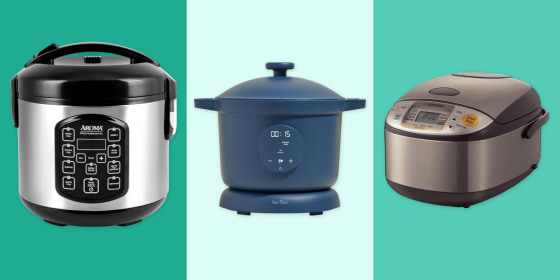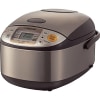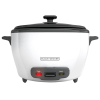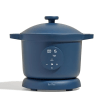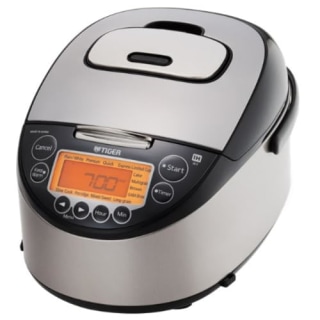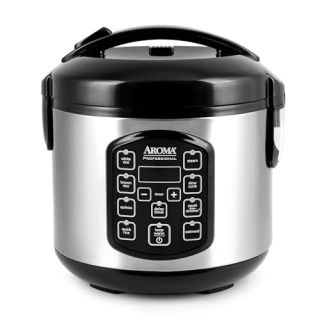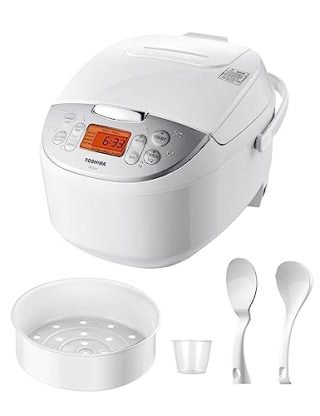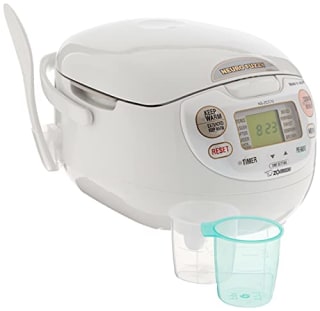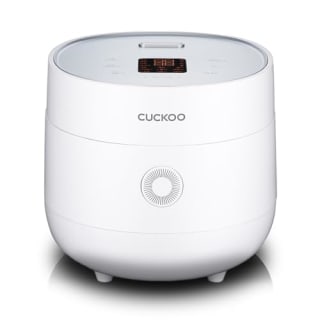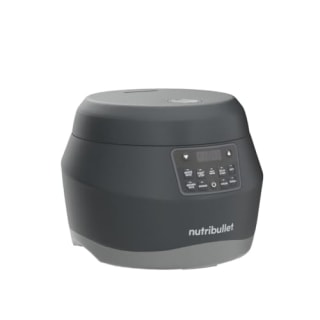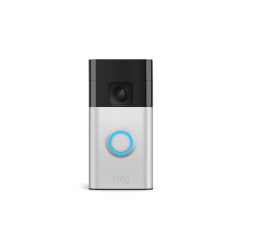Rice is one of the most widely consumed grains in the world and a staple in many cultures. And for good reason: it’s extremely versatile, acting as a side dish or main element of many meals.
But preparing the ideal fluffy rice can be tricky, especially considering cooking time, measurements and ratios. That’s where a rice cooker comes in handy — with just a touch of a button, it helps you get the perfect consistency and texture every time.
To learn more about how these appliances work and how to determine which one is right for you, we spoke to professional chefs, cooking teachers and food bloggers, who also shared their recommendations.
How we picked the best rice cookers
Not all rice cookers are the same: They can vary from basic one-button types to high-tech options with multiple functions (including ones that cook grains like quinoa and oatmeal, or steam vegetables). When shopping, our experts recommended considering the following key factors:
- Model type: A conventional rice cooker is the most basic device. It is typically more affordable than other options, and usually includes a ‘keep warm’ function and a button that cooks your rice. Smart rice cookers can automatically make small adjustments and generally include more preset functions.
- Settings: This typically includes a “keep warm” button, a timer and options to cook different foods, such as oatmeal or vegetables.
- Ease of use: Depending on your preference, this can include clearly labeled buttons and removable, easy-to-clean inner pots.
- Cooking time: Some devices will cook rice in as little as 20 minutes, while others may take 10-25 minutes longer to achieve the ideal consistency.
- Capacity: Usually ranges from 3-10 cups of cooked rice.
- Washability: You’ll want to ensure you can thoroughly clean your rice cooker between uses. Models with detachable inner pots make this task much easier, says Kevin Ashton, a chef and culinary advisor at the restaurant search tool Restaurantji.
- Lid: Rather than a lid that comes fully off, look for a model with one on a hinge. “It naturally encourages keeping the lid closed when not being actively served and is more sanitary,” explains Jayasinghe. A free lid must be placed somewhere when being opened, which presents opportunities for cross-contamination.”
Want more from NBC Select? Sign up for our newsletter, The Selection, and shop smarter.
Best rice cookers of 2026
Below, we compiled the best rice cookers to buy based on our experts’ guidance and recommendations.
All our experts recommend the Japanese brand Zojirushi for rice cookers. Both Yuki Gomi, owner of Yuki’s Kitchen and author of “Sushi at Home,” and Yoko Lamn, a certified fermentation expert and founder of food blog Hakko, suggest this specific 5.5-cup model that they’ve been using for years. “It isn’t too expensive and has all the functions I need,” including fast cooking, an option for brown rice and a steaming function, said Lamn.
This smart rice cooker uses “fuzzy logic,” where the device makes small adjustments along the way to cook the ideal rice. It also comes with a reheat option, and an extended function that keeps rice warm for several hours, according to the brand.
Lamn also recommends this rice cooker from Tiger. “The heat efficiency is very high and the whole kiln heats up evenly, so the rice cooks evenly as well,” says Lamn. This model has a large inner pot with a nonstick ceramic coating and a function that retains the rice’s heat for up to 24 hours, according to Tiger. You’ll also find multiple settings to cook different types of grains, including porridge, brown rice and multigrain rice, along with a slow-cooking option.
Aroma makes rice cookers that are typically “less expensive and [more] basic” than other high-tech brands, but still capable of making good rice, according to Makiko Itoh, the creator of Japanese cooking site Just Hungry and author of “The Just Bento Cookbook.” This 8-cup model includes a user-friendly display with eight presets, including brown rice, quinoa, and oatmeal, as well as a slow-cook option. Plus, you can steam food and vegetables via the accompanying tray while also simultaneously cooking rice. The sauté-then-simmer function also lets you cook at a high heat before automatically switching to a “simmer” mode once liquid is added, according to the brand.
Gomi’s a fan of Toshiba’s high-quality rice cookers — specifically this 6-cup option, which includes seven pre-programmed settings for rice as well as quinoa, oatmeal and porridge. It has two programmable options that let you plan ahead and set a timer for whenever you want your meal ready, plus it also includes a “quick rice” function that cooks rice in 30 minutes, according to Toshiba.
Although not as robust, our experts say this simple, easy-to-use rice cooker from Black & Decker is more than capable of delivering a great batch of rice. It cooks up to 6 cups of rice with just one button. Included is a measuring cup, a rice paddle and a plastic steamer basket. The indicator lights alert you when the rice is warm. Plus, the tempered-glass lid features a steam vent with handles on the top and sides.
This popular rice cooker brand offers a variety of sizes and models. This one includes two measuring cups and a rice scoop. “It’s my favorite rice cooker because it has a non-stick inner pot, clear waterline markings and it serves multiple functions,” says Ashton. Those functions include settings for white, brown and sushi rice, as well as for porridge. The machine also has a quick cook and keep warm setting.
NBC Select contributing editor Bethany Heitman has a small kitchen and prefers investing in new appliances that serve multiple functions. That’s what drew her to this multi-cooker from Our Place. Along with cooking up to 9 cups of rice, it can serve as a slow cooker, pressure cooker or used to saute things. She likes its clean aesthetic and the simple, straightforward buttons. It also has a locking lid, hands-free steam release and a removable inner cooking pot.
Along with rice, this cooker can make porridge, quinoa, oatmeal and more. The nonstick inner pot is removable and the hinge lid opens easily with the push of a button. It can make up to 6 cups of uncooked rice and has a keep warm function. It also has an auto-clean function that steam cleans the interior.
Nutribullet may be best known for its blenders, but this rice cooker has solid reviews, too. It contains brown rice, white rice, quinoa, oats and grains presets. It also has a steam function, which allows you to cook veggies and fish, as well as a delayed start and keep warm button. The removable cooking pot has measurements engraved into it and it comes with a steaming basket and measuring cup, too.
What exactly is a rice cooker and what are the benefits?
In 1945, Mitsubishi developed the first consumer-oriented rice cooker in Japan. About a decade later, Toshiba released the first automated electric rice cooker, followed by Zojirushi’s creation of the electric cooker we typically see today with a “keep warm” function.
Rice cookers eventually spread to several countries including Korea (which now make several popular models), and the U.S. (which produces some of the more basic and inexpensive options on the market). And the popularity of rice cookers worldwide comes as no surprise: Using one gives you the flexibility to leave your kitchen without having to constantly monitor a pot on the stove, Gomi says. And unlike the stovetop method — which involves placing a 2:1 ratio of water and rice in a pot and letting it simmer until it’s cooked — you’re more likely to get the same result every time.
Today, rice cookers are a kitchen staple in many households and are “as common as a toaster in Japan [and] typically the centerpiece of our table,” according to cooking teacher and author Sonoko Sakai.
Conventional versus smart rice cookers
The experts we spoke to separated the appliance into two main categories: Conventional and smart, micro-computerized rice cookers. Conventional ones tend to be easy to use — you just add your ingredients and press a button to start. These are inexpensive and usually cook rice quickly, with some having additional features like a warming function.
Smart rice cookers, on the other hand, use logic to determine the best way to cook and provide a multifunctional aspect that “eliminates the guessing work” of cooking different variations of rice, according to Lamn. These machines can also make small adjustments on their own (for example, if you mess up the ratio of ingredients to water or leave the rice in for too long). While smart rice cookers usually provide the best cooking results, they’re typically more expensive than your conventional options.
How to shop for a rice cooker
The best rice cooker for you will depend on how you’re planning to use it and how often. Below are some main features experts recommend considering when shopping.
Decide on a capacity
Your device’s ideal capacity will depend on how often you eat rice and how many people you’re hoping to feed. Rice cooker capacities can range from 3 cups up to 10 cups, according to our experts. Both Sakai and Gomi recommend a 5-cup model for families of four. The 3-cup option is great for single students or families who only occasionally eat rice, Sakai said. Larger families, as well as those who typically use rice as the main element of their meals, will likely benefit from a 7-cup or 10-cup rice cooker.
Prioritize functions
Many rice cookers are multifunctional — some have steamer functions for vegetables and dumplings and/or slow-cook options for meats, according to experts. You’ll also find multiple preset functions that can cook various types of grains, including brown rice, sushi rice, porridge and more.
One of the most important features of any rice cooker is the “keep warm” function, which allows you to keep a large amount of rice at an edible temperature, which is useful for large crowds or families.
Another helpful feature to look for is a timer, which is great for those who want to start their meal prep early, according to Itoh. This lets you place rice and water in the pot in advance and select when you want it done by.
Ease of use
If you’re someone who occasionally eats rice, the simple design of a conventional cooker is likely all you need. Cleaning one is generally easier than a stovetop pot since the rice usually doesn’t stick to the bottom. However, some affordable models can be tougher to clean, Gomi says. Sakai recommends gently using soap and water to avoid scratching the inner pot. Similarly, she also recommends rinsing the rice outside of the cooker — preferably using a colander — to avoid scratching. (If you do happen to scrape it, inner pots are easy to replace and can cost less than $100, Sakai says.)
Factor in time
Different models will vary in terms of cooking time — some will cook rice in as little as 20 minutes, while others (typically more high-tech options) may take 10-25 minutes longer, according to our experts. Different rices will also vary in cook time. Always refer to the device’s user manual to determine the appropriate timing.
Meet our experts
At NBC Select, we work with experts who have specialized knowledge and authority based on relevant training and/or experience. We also take steps to ensure that all expert advice and recommendations are made independently and with no undisclosed financial conflicts of interest.
- Yuki Gomi is the owner of Yuki’s Kitchen cooking classes and author of “Sushi at Home.”
- Yoko Lamn is a certified fermentation expert and founder of food blog Hakko.
- Makiko Itoh is the founder of Japanese cooking site Just Hungry and author of “The Just Bento Cookbook.”
- Sonoko Sakai is a cooking teacher based in California and author of “Japanese Home Cooking: Simple Meals, Authentic Flavors.”
- Kevin Ashton is a chef and culinary advisor at the restaurant search tool Restaurantji.
Why trust NBC Select?
Mili Godio is an editor at NBC Select who has covered a variety of home and kitchen topics, including coffee makers, vacuums, meal kit delivery and more. For this article, Godio spoke to five chefs and food bloggers about how to shop for a rice cooker, how they work and the best ones to consider. She also researched dozens of rice cookers on the market that were in line with experts’ guidance.
Bethany Heitman is a contributing editor at NBC Select and a journalist who regularly covers beauty, home and lifestyle. For this story, she interviewed chefs about what to look for in a rice cooker.
Catch up on NBC Select’s in-depth coverage of tech and tools, wellness and more, and follow us on Facebook, Instagram, Twitter and TikTok to stay up to date.


